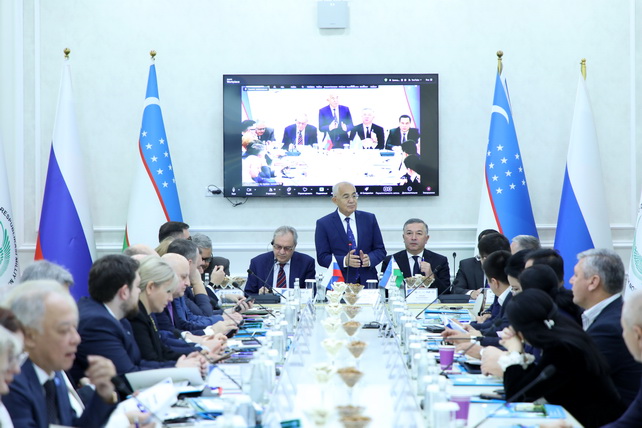
On the Path to Forming a Unified Labor Market in the Region and Improving Migration Policy
On the Path to Forming a Unified Labor Market in the Region and Improving Migration Policy
Tashkent, Uzbekistan (UzDaily.com) — On 2 October, the Uzbekistan-Russia “roundtable” on the topic “Improving Migration Policy within the Framework of Forming a Unified Labor Market of the CIS” was held at the National Center of the Republic of Uzbekistan for Human Rights in Tashkent.
The event was organized as part of the visit of a delegation led by Valery Fadeev, Advisor to the President of the Russian Federation and Chairman of the Council under the President of the Russian Federation for the Development of Civil Society and Human Rights.
The roundtable was co-organized by the National Center of the Republic of Uzbekistan for Human Rights, the Migration Agency under the Cabinet of Ministers of Uzbekistan, the Ministry of Foreign Affairs of Uzbekistan, the Council under the President of the Russian Federation for the Development of Civil Society and Human Rights, and the “St. Petersburg Dialogue” Forum.
Opening the discussion, Akmal Saidov, Director of the National Center of the Republic of Uzbekistan for Human Rights, emphasized that the protection of labor rights in the New Uzbekistan is one of the priority areas of the state human rights policy. Accordingly, the creation of a fair and legally protected labor market within the Commonwealth of Independent States is an important step toward strengthening mutual trust between peoples, minimizing social risks, and ultimately achieving the UN Sustainable Development Goals.
President Shavkat Mirziyoyev recently highlighted, in his speech at the 80th session of the UN General Assembly, the escalating issue of climate change worldwide and drew the international community’s attention to another negative consequence—intensified climate-related migration. The head of state noted, “Unfortunately, there are still no concrete international mechanisms or legal frameworks in this area. We advocate for the adoption of a Global Pact on broad international cooperation and the implementation of coordinated policies on this serious issue.”
Saidov stressed the symbolic significance of discussing the creation of a unified labor space in the region within the framework of cooperation between Uzbek and Russian law enforcement and relevant state bodies. This issue carries strategic importance not only from the perspective of humanitarian concerns and human rights protection but also for strengthening economic stability, social integration, and ensuring a sustainable future across the CIS.
Valery Fadeev, Advisor to the President of the Russian Federation, noted the active development of cooperation between Russia and Uzbekistan. Regarding the economy, he emphasized that trade turnover has exceeded US$10 billion and has more than doubled over the past six years.
Fadeev also pointed out that migration issues remain a challenge that must not be ignored but actively addressed. He stressed that, based on the discussions and recommendations generated during the roundtable, a final document should be prepared for submission to executive and legislative authorities, as well as the parliaments of both countries, to develop concrete administrative measures on these matters.
The roundtable was attended by Behzod Musaev, Director of the Migration Agency under the Cabinet of Ministers of Uzbekistan, Olimjon Abdullaev, Deputy Minister of Foreign Affairs of Uzbekistan, and Alexey Erkhov, Ambassador of the Russian Federation to Uzbekistan. Experts and specialists from both countries also shared their insights.
During the discussions, the need for continuous improvement of migration policies on both sides—host and sending countries—was recognized. These issues are particularly relevant in the context of forming a unified labor market among CIS countries. Uzbekistan consistently advocates for safe and orderly migration and makes ongoing efforts to increase the share of organized labor migration.
In conclusion, the roundtable emphasized that establishing a unified labor market in the CIS is not merely a legal or economic matter but a humanitarian project aimed at ensuring decent living conditions for millions in the region.
Uzbekistan-Russia cooperation in this area demonstrates a pragmatic approach to migration, labor rights, and the free movement of citizens, reflecting a deep commitment to humanistic principles. Both sides are capable not only of discussing urgent problems in the spirit of unity but also of finding effective, practical solutions that align with the interests of their peoples and the demands of a new era.
The roundtable participants included members of the Russian delegation, deputies of the Legislative Chamber and Senate of Uzbekistan’s Oliy Majlis, representatives of relevant ministries and state bodies, national human rights institutions, scientific and educational organizations, and civil society institutions.
The event also featured online participation by Uzbekistan’s general consuls in Moscow, Saint Petersburg, Kazan, Vladivostok, Yekaterinburg, Novosibirsk, and Rostov-on-Don, as well as heads and regional representatives of the Uzbekistan Migration Service in Moscow, Saint Petersburg, Novosibirsk, Yekaterinburg, Samara, Krasnodar, and Blagoveshchensk.